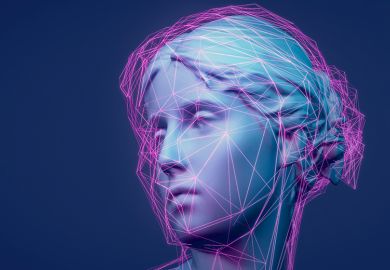Artificial intelligence products could become a credit risk for universities, a major credit rating agency has warned.
Since its emergence, Open AI’s ChatGPT – and its successor GPT-4 – has already transformed higher education in many ways.
But a new report by Moody’s Investor Service says that ChatGPT and other AI tools, such as Google’s Bard, have the potential to compromise academic integrity at global colleges and universities.
The report – from one of the largest credit ratings agencies in the world – also says they pose a credit risk.
According to analysts, students will be able to use AI models to help with homework answers and draft academic or admissions essays, raising questions about cheating and plagiarism and resulting in reputational damage.
“Awkward phrasing or incorrect grammar from existing chatbots may be easy to detect now, but determining which text is human- or AI-created will become more difficult as the technology improves in the months and years ahead, potentially increasing time and costs to monitor integrity,” the report says.
In addition, Moody’s warns that chatbots might create some privacy risks, increasing the need for protections to ensure AI models do not disclose students’ personal and financial information to outside parties.
The report says the use of AI in inappropriate settings carries “reputational risks”, as Vanderbilt University recently discovered when it was found to have used ChatGPT to produce an email addressing a shooting at another institution.
“The campus community noticed a disclosure that ChatGPT was used to generate the condolence email, sparking an outcry and calling into question the usefulness of these models in certain scenarios,” says the report.
However, the tools also present substantial opportunities for innovation and improvement in educational offerings along with administrative efficiencies and cost savings, it adds.
“Although there is uncertainty as the technology continues to evolve rapidly, the opportunities for innovation, greater productivity and operational efficiencies are a credit positive for universities that can effectively manage the risks to their academic integrity.”
According to Moody’s, AI and natural language processing (NLP) offer opportunities to improve educational outcomes, especially as GPT models become more advanced.
And its report highlights some non-academic applications of the software for universities, including customer relationship management and enrolment management.
“Models may also aid students in selecting courses to meet graduation requirements and personal interests, reducing academic-advising costs,” the report adds.
“Improved advising tools also have the potential to improve student retention and academic outcomes.”
Register to continue
Why register?
- Registration is free and only takes a moment
- Once registered, you can read 3 articles a month
- Sign up for our newsletter
Subscribe
Or subscribe for unlimited access to:
- Unlimited access to news, views, insights & reviews
- Digital editions
- Digital access to THE’s university and college rankings analysis
Already registered or a current subscriber?








